Refine search
Actions for selected content:
35 results
Chapter 10 - Anthropology and the Deaf and Dumb
- from Part II - Historical and Philosophical Implications
-
-
- Book:
- Kant on Language
- Published online:
- 19 September 2025
- Print publication:
- 09 October 2025, pp 178-196
-
- Chapter
- Export citation

Reinach and the Foundations of Private Law
-
- Published online:
- 20 July 2025
- Print publication:
- 07 August 2025
-
- Book
-
- You have access
- Open access
- Export citation
I - The Cats of Queen Berúthiel
-
- Book:
- Tolkien and the Mystery of Literary Creation
- Published online:
- 17 April 2025
- Print publication:
- 08 May 2025, pp 22-83
-
- Chapter
- Export citation
Late Wittgenstein’s money
-
- Journal:
- Finance and Society / Volume 11 / Issue 1 / April 2025
- Published online by Cambridge University Press:
- 05 March 2025, pp. 123-130
-
- Article
-
- You have access
- Open access
- HTML
- Export citation
Chapter 6 - The Language Problem
-
- Book:
- Otto Neurath in Britain
- Published online:
- 09 January 2025
- Print publication:
- 23 January 2025, pp 154-178
-
- Chapter
- Export citation
Shifting the spotlight: What do we mean by ‘religious language’?
-
- Journal:
- Religious Studies / Volume 61 / Issue 2 / June 2025
- Published online by Cambridge University Press:
- 28 October 2024, pp. 293-307
- Print publication:
- June 2025
-
- Article
- Export citation
God's pronouns
-
- Journal:
- Scottish Journal of Theology / Volume 77 / Issue 4 / November 2024
- Published online by Cambridge University Press:
- 23 May 2024, pp. 313-328
- Print publication:
- November 2024
-
- Article
-
- You have access
- Open access
- HTML
- Export citation
Chapter 5 - Shades of Naturalism
- from Part II - Naturalism and Method
-
-
- Book:
- Interpreting Carnap
- Published online:
- 01 February 2024
- Print publication:
- 08 February 2024, pp 89-105
-
- Chapter
- Export citation
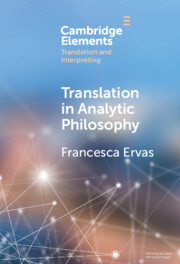
Translation in Analytic Philosophy
-
- Published online:
- 17 December 2023
- Print publication:
- 18 January 2024
-
- Element
- Export citation
THE PROBLEM OF LANGUAGE IN ENNODIUS OF PAVIA
-
- Journal:
- The Classical Quarterly / Volume 73 / Issue 2 / December 2023
- Published online by Cambridge University Press:
- 05 February 2024, pp. 916-925
- Print publication:
- December 2023
-
- Article
-
- You have access
- Open access
- HTML
- Export citation
1 - The Multidisciplinary Field of Referring
- from Part I - The Nature of Referring and Referring Expressions
-
- Book:
- Referring in Language
- Published online:
- 22 June 2023
- Print publication:
- 25 May 2023, pp 3-22
-
- Chapter
- Export citation
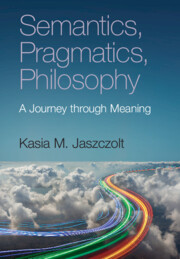
Semantics, Pragmatics, Philosophy
- A Journey through Meaning
-
- Published online:
- 22 March 2023
- Print publication:
- 16 March 2023
-
- Textbook
- Export citation
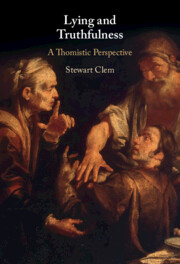
Lying and Truthfulness
- A Thomistic Perspective
-
- Published online:
- 22 December 2022
- Print publication:
- 05 January 2023
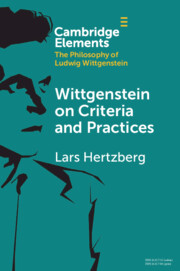
Wittgenstein on Criteria and Practices
-
- Published online:
- 08 December 2022
- Print publication:
- 05 January 2023
-
- Element
- Export citation
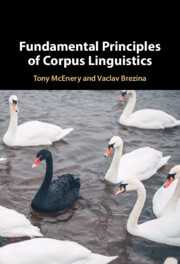
Fundamental Principles of Corpus Linguistics
-
- Published online:
- 22 September 2022
- Print publication:
- 29 September 2022
Chapter 4 - Logic, Language, and the Question of Method in Heidegger
- from Part II - Language, Logic, and Nonsense
-
-
- Book:
- Heidegger on Logic
- Published online:
- 15 September 2022
- Print publication:
- 22 September 2022, pp 73-89
-
- Chapter
- Export citation
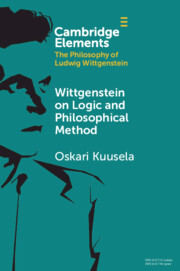
Wittgenstein on Logic and Philosophical Method
-
- Published online:
- 24 May 2022
- Print publication:
- 23 June 2022
-
- Element
- Export citation
12 - Action and Accountability in Interaction
- from Part III - Revisiting Action Ascription
-
-
- Book:
- Action Ascription in Interaction
- Published online:
- 17 February 2022
- Print publication:
- 24 February 2022, pp 279-296
-
- Chapter
- Export citation
Chapter 2 - Life
-
- Book:
- The Cambridge Introduction to Mikhail Bakhtin
- Published online:
- 21 October 2021
- Print publication:
- 04 November 2021, pp 5-29
-
- Chapter
- Export citation
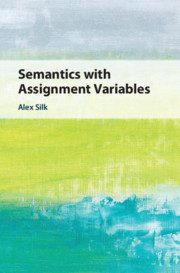
Semantics with Assignment Variables
-
- Published online:
- 09 July 2021
- Print publication:
- 24 June 2021
